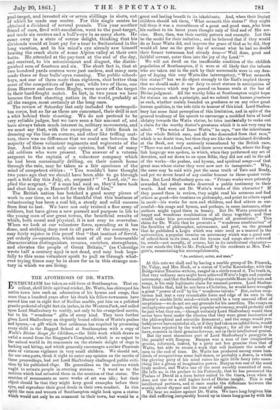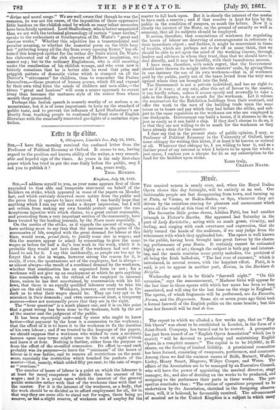THE APOTHEOSIS OF DR. WATTS. E NTHUSIASM has taken an odd
form at Southampton. That ex- cellent, shrill little spiritual cricket, Dr. Watts, has chirruped his native town into such an admiration of his hymns and songs, that more than a hundred years after his death his fellow-townsmen have carved him out in eight feet of Sicilian marble, put him on a polished granite pedestal of eight feet six inches, in the WestemPark, and called upon Lord Shaftesbury to certify, not only to his evangelical merits, but to his " wondrous " gifts of every kind. They have further given Lord Shaftesbury an elegantly bound edition of Watts's psalms and hymns,--a gift which that nobleman has requited by presenting every child in the Ragged School at Southampton with a copy of Waits's Divine Songs for Children,—the little work which draws so awful a moral from the Sluggard's Complaint, which is so unjust to the animal world in its comments on the chronic delight of dogs in barking and biting, and which generally encourages a rather Pharisaic state of virtuous vigilance in very small children. We should not, for our own parts, think it right to enter any opinion on the merits of these proceedings, had not Lord Shaftesbury challenged public criti- cism by his published eloge. He generalizes on the motives which ought to actuate people in erecting statues. "A word as to the motives which had actuated them in the erection of that statue. The erection of monuments as mere works of art was idle; but their object should be that they might keep good examples before their eyes, and reproduce their good deeds in their own conduct. In this Spirit the men and women of Southampton might look upon a statue Which would not only be an ornament to their town, but would be a great and lasting benefit to its inhabitants. And, when their lisping children should ask them, What meaneth this statue?' they might tell them it was a resemblance of a great and good man, who from his earliest to his latest years thought only of God and of His ser- vice. Here, then, was their earthly pattern and example. Let this be the model for their imitation; and he believed that if they would do as Isaac Watts did, and improve the grace of God as he did, they would all hear on the great day of account what he had no doubt their former townsman had already done= Well done, good and faithful servant, enter thou into the joy of thy Lord."
We will not dwell on the insufferable condition of the childish population of Southampton, if it were at all likely that the infants who are taken out in the park by their nursemaids were in any dan- ger of lisping this very Watts-like interrogatory, "What meaneth this statue ?" but we do object strongly to the Earl's implied theory that we should make it our duty to erect statues in anticipation of the sentences which may be passed on human souls at the bar of Divine judgment. All the worthy folks at Southampton might hope for statues on such a principle, and we submit that human greatness as such, whether mainly founded on goodness or on any other great human qualities, is the sole title to honour of this kind. Lord Shaftes- bury has some faint perception of this limitation, and in spite of the general tendency of his speech to encourage a modified form of local idolatry towards the Watts statue, he tries incidentally to make out a claim for the worthy doctor's greatness which it is not very easy to admit. "The works of Isaac Watts," he says, "are the inheritance of the whole British race, and all who descended from that race," which is no doubt true, but then they are like the unclaimed dividends at the Bank, not very anxiously remembered by the British race. "There was not a land now, and there never would be, where the Eng- lish language was spoken, in which, when they performed any act of devotion, and sat down to an open Bible, they did not call in the aid of the works—the psalms, and hymns, and spiritual songs—of that great man whose statue they were now met to inaugurate." Why, the same may be said with just the same truth of Tate and Brady, and yet we never heard of any similar honour to those quaint versi- fiers. But Lord Shaftesbury goes on: "Private works were privately rewarded, but public works deserved a public testimony to their worth. And were not Dr. Watts's works of this character ? If they passed them in review, they might read his sermons and find others as good—his treatises on philosophy, and point to others equal in merit—his works for men and children, and find others as suc- cessful—his songs and hymns, and perhaps, in some instances, other authors might equal them in beauty. But Dr. Watts presented a happy and wondrous combination of all these together, and that would make hint pre-eminent throughout all generations." This claim for Dr. Watts that he presents a "wondrous combination" of the faculties of philosopher, astronomer, and poet, on the ground that he published a Logic which was once used as a manual in the universities, a popular treatise on astronomy which was a good sort of school-book in its time, and the hymns and songs above referred to, recals—not morally, of course, but in its intellectual character— to pur minds the Ode to Mr. Pecksniff by the residents at Mrs. Tod- gers's, enumerating his accomplishments,
"As architect, artist, and man."
At this rate we shall end by having a marble group of Dr. Pinnock, Dr. Valpy, and Mrs. Hack, or a statue of -Useful Knowledge, with the Bridgewater Treatise-writers, ranged in a circle round it. The truth is that very ordinary men might have achieved Watts's logic and popular astronomy: and that the fecundity of his respectableMuse in hymns and songs, is his only legitimate claim for unusual powers. Lord Shaftes- bury thinks that, had he not been a Christian, he would have wrought a great "power of evil" by his "wondrous talents." But, unless scep- ticism had lent a very remarkable force and edge of its own to the Doctor's nimble little mind—which would be a very unusual effect of scepticism—we do not see any grounds for his assertion. The essays on metaphysics and logic, and the popular astronomy, would probably still be just what they are,—though certainly Lord Shaftesbury would then never have been under the illusion that they were great luminaries of the philosophical and scientific firmament ; and the songs would pro- bably never-haveexistedat all, or if they had taken an infidel form, would have been rejected by the world with disgust; for all the merit they have, consists in their genuine fervour, not in their intellectual genius. But the most shameless part of Lord Shaftesbury's panegyric is the parallel with Bunyan. Bunyan was a man of rare imaginative genius, informed, indeed, by a piety not less genuine than that of Watts, but able to create a work that will fascinate the minds of men to the end of time. Dr. Watts has produced among some hun- dreds of compositions some half-dozen, or probably a dozen, in which the glowing piety of his mind raises his agile little fancy into some- thing like a gleam of imaginative power. Bunyan was one of the most truly modest, and Watts one of the most amiably conceited of men. He tells us, in the preface to his Psalmody, that he has presented the Psalms of David in a form better suited to the times, even when it does not rise to a still higher level of Divine insight. This is real intellectual pertness, and at once marks the difference between the worthy clever rhymer and the man of solid genius. We bear no malice against Dr. Watts. We have long forgiven him the dull suffering.inseparably bound up in times long gone by with his "divine and moral songs." We are well aware that though he was the occasion, he was not the cause, of the imposition of those oppressive little burdens on the childish mind by which so many infant, memories have been fatally sprained. Lord Shaftesbury, who is better acquainted than we are with the technica/ phraseology of certain " inner circles," speaks to the enthusiasts at Southampton of Dr. Watts's "great and luscious works." Whether this adjective has a transcendental and peculiar meaning, or whether the immortal poem on the little busy bee "gathering honey all the day from every opening flower," has ob- tained this honeyed epithet for the rather dry fruits which Dr. Watts has elaborated out of the rich clusters of Hebrew inspiration, we cannot say; butte the ordinary Englishman, who is still smarting under the recollection of his ch. "sh wrongs, and who even now is bitterly conscion.s that he is better able to recal that prim and priggish pattern of domestic virtue which is stamped on all the Doctor's "utterances" for children, than to remember the Psalms themselves,.—those greatest of human poems, which fill and expand by their own vital force the minds of children and men alike,—the terms "great and luscious" will seem a nearer approach to covert irony than becomes the unctuous style of the orator from whose month they proceeded.
Perhaps- this foolish speech is scarcely. worthy of so serious a re- monstrance, but it is of some, importance to keep up the standard of public taste, and to prevent the influence of Lord Shaftesbury's au- thority from teaching people to confound the fixed stars of English literature with the constantly renovated gas-lights of a sectarian repu- tation.































 Previous page
Previous page